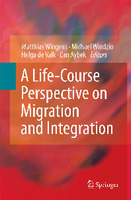A Life-Course Perspective on Migration and Integration
| dc.contributor.author | Windzio, Michael | |
| dc.contributor.author | Valk, Helga de | |
| dc.contributor.author | Wingens, Matthias | |
| dc.contributor.author | Aybek, Can | |
| dc.date.accessioned | 2012-12-31 23:55:55 | |
| dc.date.accessioned | 2020-03-18 13:36:15 | |
| dc.date.accessioned | 2020-04-01T15:19:32Z | |
| dc.date.available | 2020-04-01T15:19:32Z | |
| dc.date.issued | 2011 | |
| dc.identifier | 413371 | |
| dc.identifier | OCN: 747413778 | en_US |
| dc.identifier | 768420017 | en_US |
| dc.identifier.uri | http://library.oapen.org/handle/20.500.12657/34540 | |
| dc.description.abstract | Over the last four decades the sociological life course approach with its focus on the interplay of structure and agency over time life course perspective has become an important research perspective in the social sciences. Yet, while it has successfully been applied to almost all fields of social inquiry it is much less used in research studying migrant populations and their integration patterns. This is puzzling since understanding immigrants’ integration requires just the kind of dynamic research approach this approach puts forward: any integration theory actually refers to life course processes. This volume shows fruitful cross-linkages between the two research traditions. A range of studies are presented that all apply sociological life course concepts to research on migrants and migrant groups in Europe. The book is organized thematically, indicating different important domains in the life course. Using a wide variety of methodological approaches, it covers both quantitative studies based on population census data and survey material as well as qualitative studies based on interviews. Attention is paid to the life courses of those who migrated themselves as well as their offspring. The studies cover different European countries, relating to one national context or a particular local setting in a city as well as cross-country comparisons. Overall the book shows that applying the sociological life course approach to migration and integration research may advance our understanding of immigrant settlement patterns as well as further develop the life course perspective. | |
| dc.language | English | |
| dc.subject.classification | thema EDItEUR::J Society and Social Sciences | en_US |
| dc.subject.classification | thema EDItEUR::J Society and Social Sciences::JB Society and culture: general::JBF Social and ethical issues::JBFH Migration, immigration and emigration | en_US |
| dc.subject.classification | thema EDItEUR::5 Interest qualifiers::5P Relating to specific groups and cultures or social and cultural interests::5PB Relating to peoples: ethnic groups, indigenous peoples, cultures and other groupings of people::5PBC Relating to migrant groups / diaspora communities or peoples | en_US |
| dc.subject.classification | thema EDItEUR::J Society and Social Sciences::JH Sociology and anthropology::JHB Sociology | en_US |
| dc.subject.other | sociology | |
| dc.subject.other | social sciences | |
| dc.subject.other | migration | |
| dc.subject.other | Ethnic group | |
| dc.subject.other | France | |
| dc.subject.other | Germany | |
| dc.subject.other | Labour economics | |
| dc.subject.other | Life course approach | |
| dc.subject.other | Youth | |
| dc.title | A Life-Course Perspective on Migration and Integration | |
| dc.type | book | |
| oapen.identifier.doi | 10.1007/978-94-007-1545-5 | |
| oapen.relation.isPublishedBy | 6c6992af-b843-4f46-859c-f6e9998e40d5 | |
| oapen.relation.isbn | 9789400715455 | |
| oapen.collection | OAPEN-NL | |
| oapen.pages | 297 | |
| oapen.place.publication | Dordrecht | |
| oapen.remark.public | Relevant Wikipedia pages: Ethnic group - https://en.wikipedia.org/wiki/Ethnic_group; France - https://en.wikipedia.org/wiki/France; Germany - https://en.wikipedia.org/wiki/Germany; Labour economics - https://en.wikipedia.org/wiki/Labour_economics; Life course approach - https://en.wikipedia.org/wiki/Life_course_approach; Youth - https://en.wikipedia.org/wiki/Youth | |
| oapen.identifier.ocn | 747413778 | |
| oapen.identifier.ocn | 768420017 |

